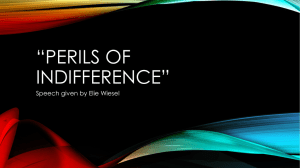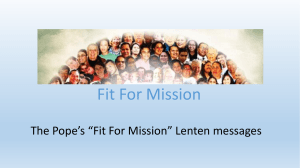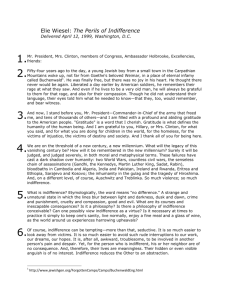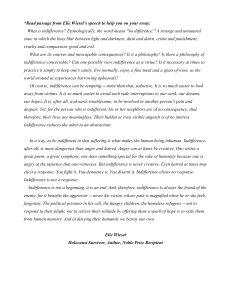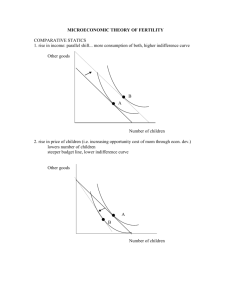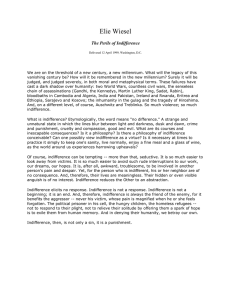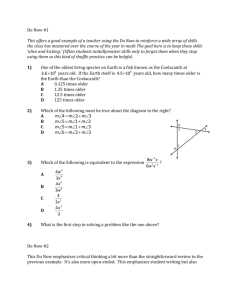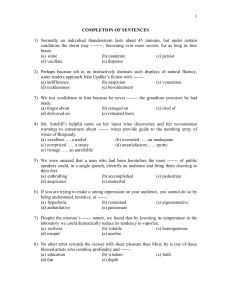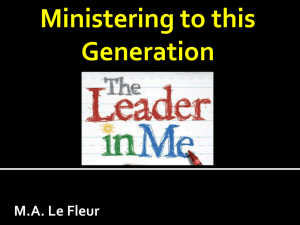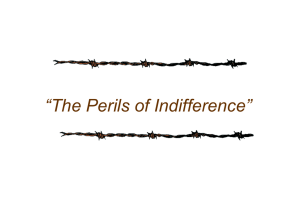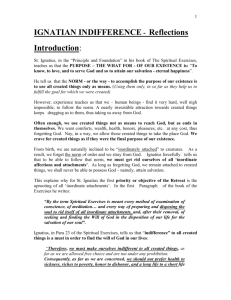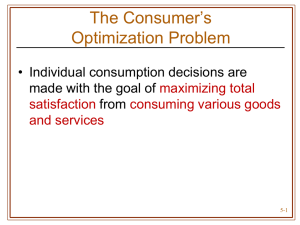The Crucible & The Perils of Indifference Excerpts
advertisement
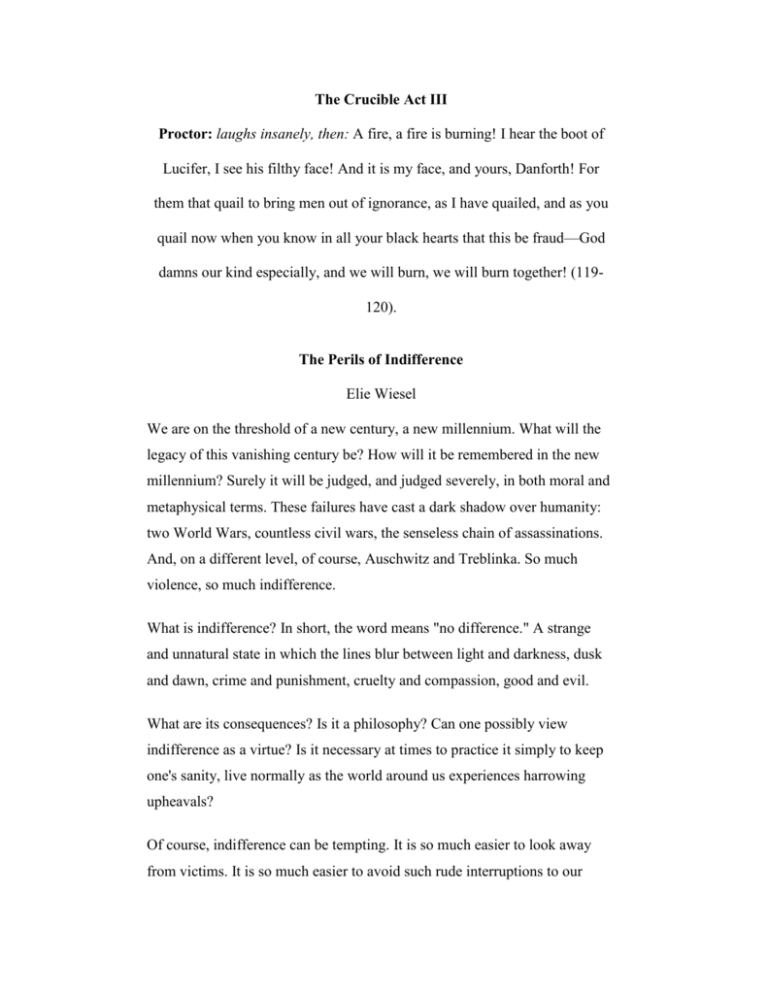
The Crucible Act III Proctor: laughs insanely, then: A fire, a fire is burning! I hear the boot of Lucifer, I see his filthy face! And it is my face, and yours, Danforth! For them that quail to bring men out of ignorance, as I have quailed, and as you quail now when you know in all your black hearts that this be fraud—God damns our kind especially, and we will burn, we will burn together! (119120). The Perils of Indifference Elie Wiesel We are on the threshold of a new century, a new millennium. What will the legacy of this vanishing century be? How will it be remembered in the new millennium? Surely it will be judged, and judged severely, in both moral and metaphysical terms. These failures have cast a dark shadow over humanity: two World Wars, countless civil wars, the senseless chain of assassinations. And, on a different level, of course, Auschwitz and Treblinka. So much violence, so much indifference. What is indifference? In short, the word means "no difference." A strange and unnatural state in which the lines blur between light and darkness, dusk and dawn, crime and punishment, cruelty and compassion, good and evil. What are its consequences? Is it a philosophy? Can one possibly view indifference as a virtue? Is it necessary at times to practice it simply to keep one's sanity, live normally as the world around us experiences harrowing upheavals? Of course, indifference can be tempting. It is so much easier to look away from victims. It is so much easier to avoid such rude interruptions to our work, our dreams, our hopes. It is, after all, awkward, troublesome, to be involved in another person's pain and despair. Yet, for the person who is indifferent, his or her neighbor are of no consequence. And, therefore, their lives are meaningless. Their hidden or even visible anguish is of no interest. Indifference reduces the other to an abstraction. Over there, behind the black gates of Auschwitz, the most tragic of all prisoners were the "Muselmanner," as they were called. Wrapped in their torn blankets, they would sit or lie on the ground, staring vacantly into space, unaware of who or where they were, strangers to their surroundings. They no longer felt pain, hunger, thirst. They feared nothing. They felt nothing. They were dead and did not know it. Rooted in our tradition, some of us felt that to be abandoned by humanity then was not the ultimate. We felt that to be abandoned by God was worse than to be punished by Him. Better an unjust God than an indifferent one. For us to be ignored by God was a harsher punishment than to be a victim of His anger. In a way, to be indifferent to that suffering is what makes the human being inhuman. Indifference, after all, is more dangerous than anger and hatred. Anger can at times be creative. One writes a great poem, a great symphony, one does something special for the sake of humanity because one is angry at the injustice that one witnesses. But indifference is never creative. Even hatred at times may elicit a response. You fight it. You denounce it. You disarm it. Indifference elicits no response. Indifference is not a response. In the place that I come from, society was composed of three simple categories: the killers, the victims, and the bystanders. During the darkest of times, inside the ghettoes and death camps, we felt abandoned, forgotten. All of us did. And our only miserable consolation was that we believed that Auschwitz and Treblinka were closely guarded secrets; that the leaders of the free world did not know what was going on behind those black gates and barbed wire; that they had no knowledge of the war against the Jews that Hitler's armies and their accomplices waged as part of the war against the Allies. If they knew, we thought, surely those leaders would have moved heaven and earth to intervene. They would have spoken out with great outrage and conviction. They would have bombed the railways leading to Birkenau, just the railways, just once. And now we knew, we learned, we discovered that the Pentagon knew, the State Department knew. And the illustrious occupant of the White House then, who was a great leader knew. No doubt, he was a great leader. He mobilized the American people and the world, going into battle, bringing hundreds and thousands of valiant and brave soldiers in America to fight fascism, to fight dictatorship, to fight Hitler. And so many of the young people fell in battle. And, nevertheless, his image in Jewish history -- I must say it -- his image in Jewish history is flawed. The depressing tale of the St. Louis is a case in point. Sixty years ago, its human cargo -- maybe 1,000 Jews -- was turned back to Nazi Germany. And that happened after the Kristallnacht, after the first state sponsored pogrom, with hundreds of Jewish shops destroyed, synagogues burned, thousands of people put in concentration camps. And that ship, which was already on the shores of the United States, was sent back. I don't understand. Roosevelt was a good man, with a heart. He understood those who needed help. Why didn't he allow these refugees to disembark? A thousand people -- in America, a great country, the greatest democracy, the most generous of all new nations in modern history. What happened? I don't understand. Why the indifference, on the highest level, to the suffering of the victims? But then, there were human beings who were sensitive to our tragedy. Those non-Jews, those Christians, that we called the "Righteous Gentiles," whose selfless acts of heroism saved the honor of their faith. Why were they so few? Why was there a greater effort to save SS murderers after the war than to save their victims during the war? Why did some of America's largest corporations continue to do business with Hitler's Germany until 1942? It has been suggested, and it was documented, that the Wehrmacht could not have conducted its invasion of France without oil obtained from American sources. How is one to explain their indifference? And yet, my friends, good things have also happened in this traumatic century: the defeat of Nazism, the collapse of communism. Does it mean that we have learned from the past? Does it mean that society has changed? Has the human being become less indifferent and more human? Have we really learned from our experiences? Are we less insensitive to the plight of victims of ethnic cleansing and other forms of injustices in places near and far? What about the children? Oh, we see them on television, we read about them in the papers, and we do so with a broken heart. Their fate is always the most tragic, inevitably. When adults wage war, children perish. We see their faces, their eyes. Do we hear their pleas? Do we feel their pain, their agony? Every minute one of them dies of disease, violence, famine. Some of them -- so many of them -- could be saved. And so, once again, I think of the young Jewish boy from the Carpathian Mountains. He has accompanied the old man I have become throughout these years of quest and struggle. And together we walk towards the new millennium, carried by profound fear and extraordinary hope. Elie Wiesel - April 12, 1999
